Frontline Reports
5 Things You Need to Know about Chad
Chad is home to one of the most diverse and vibrant people groups on the planet. The country also faces multiple humanitarian crises including political uncertainty, food insecurity and climate instability.
Over five million people are food insecure, and nearly 1.7 million suffer from recurrent cases of preventable diseases. What’s more, Chad plays host to thousands of refugees and internally displaced people — a displacement crisis that The United Nations High Commissioner for Refugees (UNHCR) says tends to go underfunded, in spite of the country’s evident need.
That’s why this year, World Relief is expanding its programming into Chad, compelled by our faith to go further and reach deeper to respond to the needs of the most vulnerable.
While Western news and media outlets often overlook stories from this Central African country, we believe it’s essential for you to get to know the people and the places where World Relief operates. With that in mind, here are 5 things you need to know about Chad, its people and its history.
1. Chad is one of the world’s most ethnically and linguistically diverse countries.
Home to over 200 ethnic groups who speak over 100 languages, it’s little wonder Chad earned the moniker “Babel Tower of the World.” The country’s two official languages are Arabic and French, echoing the country’s not-so-distant colonial past.
About 75% of Chad’s population live in rural areas and belong to a nomadic or pastoral tribe, while others primarily live in and around the capital city of N’Djamena.
2. Lake Chad, a primary ecosystem and food source, has lost 90% of its original surface area and counting.
Many people depend on Lake Chad for fishing, farming and as a watering source for herds of cattle and goats. Yet because of climate change, the lake’s ability to serve as a sufficient resource shrinks yearly, contributing to conflict over access to its shores.
Extreme weather patterns in the region prohibit the primarily agrarian society from reaping sufficient harvests year after year. The length of “lean seasons,” the time before crops are ready to harvest, also continues to grow.
Faced with such volatile weather and arid land, some Chadians are now partnering with scientists to integrate indigenous farming methods and rehabilitate the dry land.
Hindou Aoumarou Ibrahim, a Chadian activist and President of the Association for Indigenous Women and Peoples of Chad, advocates for the importance of using traditional knowledge to combat the effects of climate change in Chad.
3. Chad hosts over 555,000 refugees and over 400,000 internally displaced persons (IDPs).
Despite Chad’s turbulent government, its doors remain open to refugees from South Sudan, Cameroon, the Central African Republic (CAR) and Nigeria, all bordering countries impacted by violence and climate change.
For example, Chad shares a border with Sudan’s Darfur region. Though not as prevalent in the news today, Darfur saw high rates of conflict in the early 2000s, which contributed to large numbers of refugees fleeing across its border to Chad.
4. As of 2020, the WHO reports a shortage of medical professionals in Chad — less than one medical doctor for every 10,000 people.
Similar to many countries during the height of the COVID-19 pandemic, Chad found its health system even more constrained by a shortage of doctors and a rising number of cases mid-2020. Chad also contended with a need for essential medical equipment, such as ventilators, medicines and vaccines.
Yet months after the pandemic began, the UN developed an innovative partnership with troubadours, or traditional storytellers, to deliver and communicate information about the virus to Chad’s remote and nomadic communities — in much the same way World Relief equipped church and community leaders in places like Rwanda. These troubadours, along with community-selected health workers, traveled between communities and, instead of news or songs, shared critical health safety measures (i.e. social distancing) to help stop COVID from spreading.
5. Chad ranks 187th out of 189 countries on the Human Development Index, and 42% of the country lives below the national poverty line.
A land-locked country of 16.8 million, Chad ranks among the poorest countries in the world today. More than 6.1 million Chadians require humanitarian assistance as of 2022, almost one-third of the country’s population.
The need in Chad is two-fold: immediate emergency responses and capacity building for holistic, long-term sustainability and ministry.
What is World Relief doing?
In 2023, World Relief will open a new office in Chad.
The Southern portion of Chad — a Christian-majority region where population density is high and humanitarian actors are few — is ideal for World Relief’s holistic ministry model. Additionally, the number of Christian humanitarian agencies who work closely with churches in the area is limited and competition for funding is low. Existing local, faith-based NGOs are in need of capacity building from an international Christian NGO like World Relief to scale and expand impact.
At World Relief, our mission calls us to listen and walk alongside the men, women and children of Chad. As our world continues to change, we must respond in new ways and go further than ever.
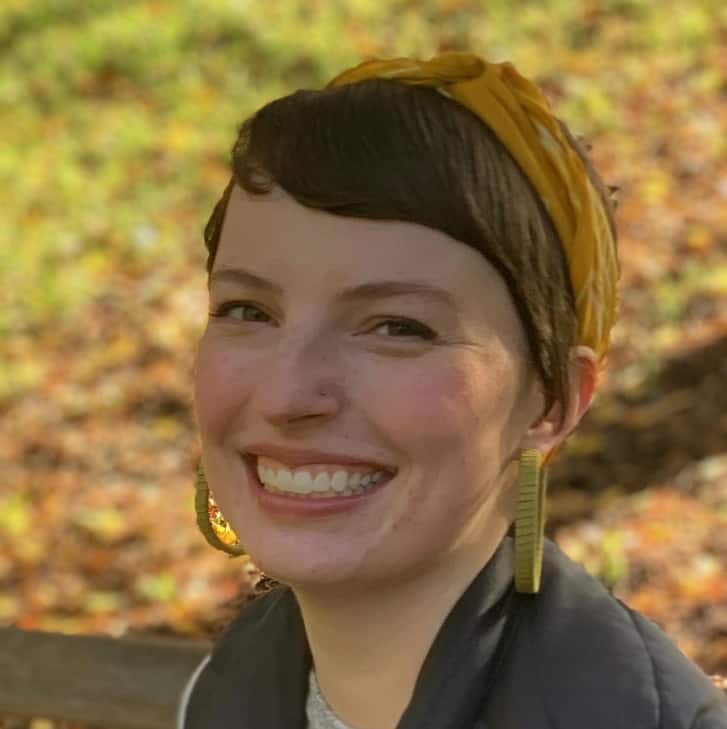
Meghan Gallagher is a Seattle-based freelance content writer and strategist. She has a B.S. in Marketing Management and a background in digital marketing for healthcare, nonprofit, and higher education organizations. When she’s not writing, you can find her working as a local bookseller and enjoying all the Seattle area has to offer.
5 Things You Should Know About the Earthquakes in Turkey and Syria
Early in the morning on February 6, massive earthquakes hit Turkey and Syria. For many of us who live thousands of miles away from the devastation, it can be hard to imagine the profound scale of loss — and even harder to know how best to respond.
And yet, if you’re like us, your faith compels you to respond.
At World Relief, our mission is to empower the local church to serve the most vulnerable. When natural disasters like this one occur, those who are already in vulnerable situations are put at even greater risk. By responding together, we can extend the love of Christ to those who are suffering in their greatest time of need.
That’s why we’ve shared five things you should know about what’s happening in Turkey and Syria, why we at World Relief are responding and how you can join us in praying for and serving those who are suffering.
1. How widespread is the impact of the earthquakes?
The earthquakes struck in the early morning hours in a region that has not experienced a major earthquake in over 200 years, leaving residents little prepared. As a result, the devastation has been widespread and severe.
At the time of writing, an estimated 36,187 have died in Turkey and more than 5,800 in Syria — and these numbers continue to rise. More than 5 million people across Syria are now in need of shelter while nearly a million more men, women and children are now homeless in Turkey as a result of the earthquakes. Basic infrastructure, including power and water, has been completely demolished in some areas.
The earthquake’s devastation is further compounded by freezing winter temperatures and, in Syria, decades of civil war have left residents especially vulnerable.
2. What are the greatest needs and how is World Relief responding?
As those impacted grapple with freezing temperatures, decimated infrastructure and profound loss and trauma, the greatest immediate needs include shelter, water, power, blankets, non-food and sanitary items and psychosocial counseling.
World Relief is responding on the ground through long-standing, trusted partners, including Tearfund Germany and the Integral Alliance. Our partners are connected with local churches and organizations in Turkey and Syria who can more quickly deliver aid — especially in hard-to-reach regions or where international aid may be restricted by governing authorities due to protracted conflicts.
Our local partners are working especially hard to provide assistance to the most vulnerable, including the elderly, children and persons with disabilities.
Thus far, our response efforts have included:
- Establishing mobile kitchens and distribution centers for food, water, hygiene supplies, emergency shelter, heaters, batteries, tools and more
- Operating mobile hygiene trailers that offer toilets, showers and washing machines
- Facilitating a kids club and trauma counseling center for children impacted by the disaster
- Providing mobility devices such as wheelchairs, protheses and walkers to those who need them
To stay up-to-date on how we’re responding to this and other crises around the world, sign up for our mailing list, here.
3. What will happen after the initial response?
Natural disasters on the scale of what we’re seeing in Turkey and Syria affect every facet of life. Responding immediately is essential to ensure the survival and safety of as many people as possible. At the same time, we at World Relief understand that rebuilding and restoring what has been broken — whether infrastructure or lives — takes time and commitment.
That’s why we’re beginning conversations with our trusted partners in the region to determine how we can best come alongside local communities so that they not only survive the current crisis, but can flourish and thrive in the future. In places like Syria, which have already been wracked by unimaginable conflict and loss, this commitment is all the more important.
4. Has World Relief worked in the affected region before?
Yes! World Relief formerly had programming in both Syria and Turkey which we transferred to our partners at Tearfund Germany in 2019. We continue to have a strong relationship with Tearfund Germany, allowing us to respond quickly and effectively through our partners who are still at work in the region.
Additionally, World Relief has been helping Syrian refugees resettle in the U.S. for over a decade. Members of the Syrian community in the U.S. have become our coworkers, neighbors and friends. We are grieving and praying alongside them at this difficult time.
5. How can I help?
- Pray: As in all things, we first turn to prayer. Pray for those who are still missing to be found, for the injured to be healed, for the hungry to be fed, for the cold and weary to find shelter and for the grieving to be comforted. Pray also for those responding to do so with wisdom and endurance.
- Give: You can rush help to Turkey and Syria by giving today. Your donation will support our partners at work in the region, ensuring more help can reach more people in this time of great need.
- Share: As the news cycle moves on to the latest headlines, you can help keep Turkey and Syria in the prayers of your friends, family and neighbors by sharing what you’ve learned in this blog.
5 Things You Should Know About the Earthquakes in Turkey and Syria
Early in the morning on February 6, massive earthquakes hit Turkey and Syria. For many of us who live thousands of miles away from the devastation, it can be hard to imagine the profound scale of loss. It’s even harder to know how best to respond.
And yet, if you’re like us, your faith compels you to respond.
At World Relief, our mission is to empower the local church to serve the most vulnerable. When natural disasters like this one occur, those who are already in vulnerable situations are put at even greater risk. By responding together, we can extend the love of Christ to those who are suffering in their greatest time of need.
That’s why we’ve shared five things you should know about what’s happening in Turkey and Syria. Here’s why we at World Relief are responding and how you can join us in praying for and serving those who are suffering.
1. How widespread is the impact of the earthquakes?
The earthquakes struck in the early morning hours in a region that has not experienced a major earthquake in over 200 years, leaving residents little prepared. As a result, the devastation has been widespread and severe.
At the time of writing, an estimated 36,187 have died in Turkey and more than 5,800 in Syria. These numbers continue to rise. More than 5 million people across Syria are now in need of shelter while nearly a million more men, women and children are now homeless in Turkey as a result of the earthquakes. Basic infrastructure, including power and water, has been completely demolished in some areas.
The earthquake’s devastation is further compounded by freezing winter temperatures and, in Syria, decades of civil war have left residents especially vulnerable.
2. What are the greatest needs and how is World Relief responding?
Those impacted now grapple with freezing temperatures, decimated infrastructure and profound loss and trauma. The greatest immediate needs include shelter, water, power, blankets, non-food and sanitary items and psychosocial counseling.
World Relief is responding on the ground through long-standing, trusted partners, including Tearfund Germany and the Integral Alliance. Our partners are connected with local churches and organizations in Turkey and Syria who can more quickly deliver aid. This is especially essential for hard-to-reach regions or where international aid may be restricted by governing authorities due to protracted conflicts.
Our local partners are working especially hard to provide assistance to the most vulnerable, including the elderly, children and persons with disabilities.
Thus far, our response efforts have included:
- Establishing mobile kitchens and distribution centers for food, water, hygiene supplies, emergency shelter, heaters, batteries, tools and more
- Operating mobile hygiene trailers that offer toilets, showers and washing machines
- Facilitating a kids club and trauma counseling center for children impacted by the disaster
- Providing mobility devices such as wheelchairs, protheses and walkers to those who need them
3. What will happen after the initial response?
Natural disasters on the scale of what we’re seeing in Turkey and Syria affect every facet of life. Responding immediately is essential to ensure the survival and safety of as many people as possible. At the same time, we at World Relief understand that rebuilding and restoring what has been broken — whether infrastructure or lives — takes time and commitment.
That’s why we’re beginning conversations with our trusted partners in the region to determine how we can best come alongside local communities so that they not only survive the current crisis, but can flourish and thrive in the future. In places like Syria, which have already been wracked by unimaginable conflict and loss, this commitment is all the more important.
4. Has World Relief worked in the affected region before?
Yes! World Relief formerly had programming in both Syria and Turkey which we transferred to our partners at Tearfund Germany in 2019. We continue to have a strong relationship with Tearfund Germany, allowing us to respond quickly and effectively through our partners who are still at work in the region.
Additionally, World Relief has been helping Syrian refugees resettle in the U.S. for over a decade. Members of the Syrian community in the U.S. have become our coworkers, neighbors and friends. We are grieving and praying alongside them at this difficult time.
5. How can I help?
- Pray: As in all things, we first turn to prayer. Pray for those who are still missing to be found, for the injured to be healed, for the hungry to be fed, for the cold and weary to find shelter and for the grieving to be comforted. Pray also for those responding to do so with wisdom and endurance.
- Give: You can rush help to Turkey and Syria by giving today. Your donation will support our partners at work in the region, ensuring more help can reach more people in this time of great need.
- Share: As the news cycle moves on to the latest headlines, you can help keep Turkey and Syria in the prayers of your friends, family and neighbors by sharing what you’ve learned in this blog.
5 Things You Should Know About the Earthquakes in Turkey and Syria
Early in the morning on February 6, massive earthquakes hit Turkey and Syria. For many of us who live thousands of miles away from the devastation, it can be hard to imagine the profound scale of loss — and even harder to know how best to respond.
And yet, if you’re like us, your faith compels you to respond.
At World Relief, our mission is to empower the local church to serve the most vulnerable. When natural disasters like this one occur, those who are already in vulnerable situations are put at even greater risk. By responding together, we can extend the love of Christ to those who are suffering in their greatest time of need.
That’s why we’ve shared five things you should know about what’s happening in Turkey and Syria, why we at World Relief are responding and how you can join us in praying for and serving those who are suffering.
1. How widespread is the impact of the earthquakes?
The earthquakes struck in the early morning hours in a region that has not experienced a major earthquake in over 200 years, leaving residents little prepared. As a result, the devastation has been widespread and severe.
At the time of writing, an estimated 36,187 have died in Turkey and more than 5,800 in Syria — and these numbers continue to rise. More than 5 million people across Syria are now in need of shelter while nearly a million more men, women and children are now homeless in Turkey as a result of the earthquakes. Basic infrastructure, including power and water, has been completely demolished in some areas.
The earthquake’s devastation is further compounded by freezing winter temperatures and, in Syria, decades of civil war have left residents especially vulnerable.
2. What are the greatest needs and how is World Relief responding?
As those impacted grapple with freezing temperatures, decimated infrastructure and profound loss and trauma, the greatest immediate needs include shelter, water, power, blankets, non-food and sanitary items and psychosocial counseling.
World Relief is responding on the ground through long-standing, trusted partners, including Tearfund Germany and the Integral Alliance. Our partners are connected with local churches and organizations in Turkey and Syria who can more quickly deliver aid — especially in hard-to-reach regions or where international aid may be restricted by governing authorities due to protracted conflicts.
Our local partners are working especially hard to provide assistance to the most vulnerable, including the elderly, children and persons with disabilities.
Thus far, our response efforts have included:
- Establishing mobile kitchens and distribution centers for food, water, hygiene supplies, emergency shelter, heaters, batteries, tools and more
- Operating mobile hygiene trailers that offer toilets, showers and washing machines
- Facilitating a kids club and trauma counseling center for children impacted by the disaster
- Providing mobility devices such as wheelchairs, protheses and walkers to those who need them
To stay up-to-date on how we’re responding to this and other crises around the world, sign up for our mailing list, here.
3. What will happen after the initial response?
Natural disasters on the scale of what we’re seeing in Turkey and Syria affect every facet of life. Responding immediately is essential to ensure the survival and safety of as many people as possible. At the same time, we at World Relief understand that rebuilding and restoring what has been broken — whether infrastructure or lives — takes time and commitment.
That’s why we’re beginning conversations with our trusted partners in the region to determine how we can best come alongside local communities so that they not only survive the current crisis, but can flourish and thrive in the future. In places like Syria, which have already been wracked by unimaginable conflict and loss, this commitment is all the more important.
4. Has World Relief worked in the affected region before?
Yes! World Relief formerly had programming in both Syria and Turkey which we transferred to our partners at Tearfund Germany in 2019. We continue to have a strong relationship with Tearfund Germany, allowing us to respond quickly and effectively through our partners who are still at work in the region.
Additionally, World Relief has been helping Syrian refugees resettle in the U.S. for over a decade. Members of the Syrian community in the U.S. have become our coworkers, neighbors and friends. We are grieving and praying alongside them at this difficult time.
5. How can I help?
- Pray: As in all things, we first turn to prayer. Pray for those who are still missing to be found, for the injured to be healed, for the hungry to be fed, for the cold and weary to find shelter and for the grieving to be comforted. Pray also for those responding to do so with wisdom and endurance.
- Give: You can rush help to Turkey and Syria by giving today. Your donation will support our partners at work in the region, ensuring more help can reach more people in this time of great need.
- Share: As the news cycle moves on to the latest headlines, you can help keep Turkey and Syria in the prayers of your friends, family and neighbors by sharing what you’ve learned in this blog.
Go Far, Go Deep, Go Together in 2023
When I was a student at Fuller Theological Seminary, one of my professors, Bryant Myers, taught me that, “At the heart of poverty is broken relationships.”
Years later, that teaching shapes the way I see the world and the way I lead at World Relief.
Myers taught that before the fall, God established five foundational relationships that each person was created to live within: relationship with God, with self, with others, with community and with creation.
When these relationships function properly, they make way for human flourishing. But when one or more of them is broken, they precipitate all types of poverty in our lives and in the lives of others:
- Broken relationships with others can cause conflicts.
- Broken relationships with creation deprive us of God’s life-giving intention for the earth — that everyone has access to beauty and sustainable food, water and resources.
- Broken relationships with ourselves mar our ability to see the potential for change and transformation.
- And broken relationships with God keep us from experiencing grace and restoration.
Current Crises, Broken Relationships
Over the last year, we’ve talked at length about how COVID, conflict and climate change have converged to create the worst humanitarian crisis we’ve seen in decades.
In these crises, we see evidence of broken relationships. War displaces families from their homes. Communities suffer the effects of natural disasters. Women and girls face increased violence and discrimination. Our own brokenness often leaves us feeling hopeless and unable to engage, while pride and division prevent us from seeking collaborative solutions to these complex problems.
It’s clear that the old paradigms of providing humanitarian aid may not be enough. If we want to move forward, we must embrace a new vision. We must remember that a flourishing world is a connected world, and it takes all of us to create change that lasts.
At World Relief, we’ve long been committed to addressing our world’s problems holistically, making way for people and communities to restore relationships and flourish. For nearly 80 years, we’ve been moving with local churches and community leaders as they create lasting change, and many of you have moved right along with us.
As we settle into the new year, the problems facing us in 2022 have not been left behind. But thanks to the generosity of people like you, World Relief is poised and ready to meet the emerging needs of our world. Together, we will go far, go deep and go together in 2023, and I’m eager to tell you how.
Go Far: Ukraine, Chad and Ethiopia
Since February 2022, World Relief has partnered with local churches and Christian agencies in Ukraine, responding to the devastating war that continues to unfold. This summer, it became evident that a long-term presence in Ukraine was necessary to meet the immense needs that will extend for years to come.
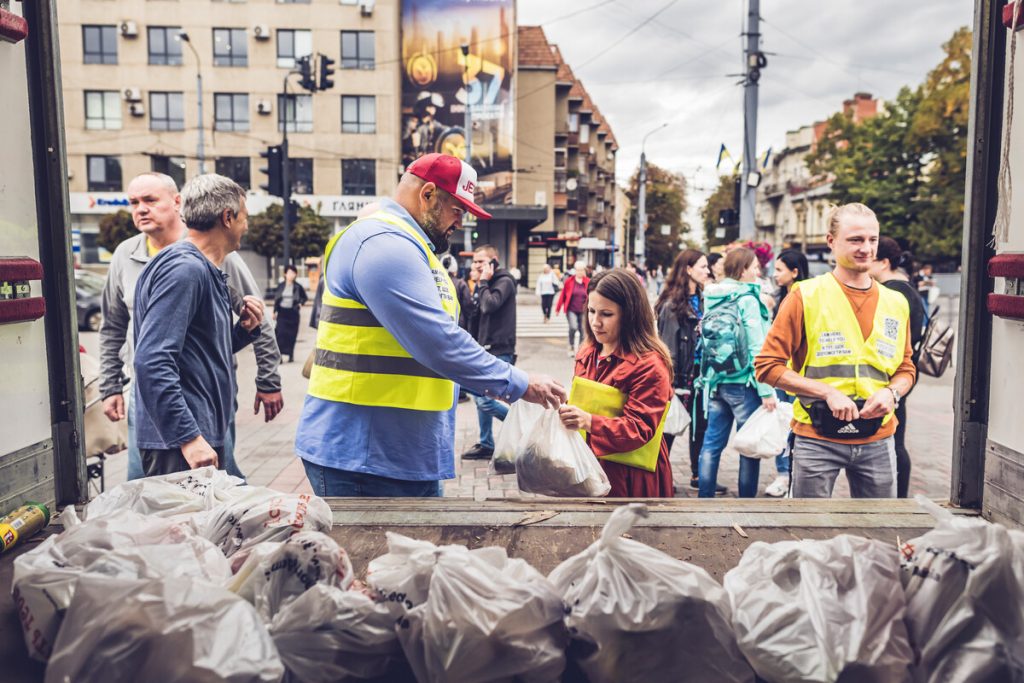
World Relief has decades of experience working in current and post-conflict settings. Our team in Ukraine will build upon our technical experience to increase the capacity of local churches to meet the physical and spiritual needs of those impacted by the war.
In Chad, we’ve also found an opportunity to strengthen local churches to meet the needs of the most vulnerable.
The Southern portion of Chad is a Christian-majority region where population density is high and humanitarian actors are few. Existing local, faith-based NGOs are in need of capacity-building support from an international Christian NGO like World Relief to scale and expand impact.
We expect the Chad office to open in early 2023, and we will also be moving forward with plans to open an office in Ethiopia as well.
Go Deep: Mental Health Counseling and Disability Inclusion
While others might focus on one area of intervention or only provide immediate assistance, we remain committed to responding to needs holistically with proven solutions that last.
For refugees and other immigrants, this means addressing the profound physical and psychological trauma many endure when they are forced to leave their homes and rebuild their lives in an entirely new culture.
World Relief offices in Chicagoland and North Carolina have been providing mental health counseling to refugees for more than 20 years. In 2023, we’re expanding this service line to more offices to better meet the needs of those experiencing displacement.
Our commitment to thriving societies is also reflected in the depth of our disability-inclusive programming. People with disabilities represent some of the most marginalized, making up 20% of the world’s poorest in developing countries.
World Relief Malawi piloted disability-inclusive programming in 2019, reaching more than 400 people through church-led initiatives in the first two years. Since then, we have expanded disability-inclusive programming to church networks in Burundi and Rwanda, and are making plans to train churches in six more countries across the globe.
Go Together: Creating Lasting Change
At the heart of our commitment to going further and deeper is our commitment to going together, equipping the individual and collective expressions of the church to live out their call to serve in both word and deed.
Our newly formed Church and Community Engagement Team is working hard to engage more people and more congregations in creating welcoming communities for immigrants in the U.S.
Globally, our Outreach Group Initiative continues to equip volunteers to meet the spiritual and physical needs of their neighbors, while savings groups are bringing people together, providing support and friendship as communities are transformed economically.
And then there’s you — as you move forward this new year, my prayer is that you would see yourself as part of a global movement that is creating change across the globe. I pray you’d find ways to strengthen the relational connections in your own life so the ripple effects of lasting change can continue to expand.
The challenges we face are great. But, by the power of Jesus, hope is even greater when we go forward together.
Do you want to be a part of this global movement? You can make a difference in 2023 by joining World Relief. Learn more and give today.

Myal Greene has a deep desire to see churches worldwide equipped, empowered, and engaged in meeting the needs of vulnerable families in their communities. In 2021, he became President and CEO after serving for fourteen years with the organization. While living in Rwanda for eight years, he developed World Relief’s innovative church-based programming model that is currently used in nine countries. He also spent six years in leadership roles within the international programs division. He has previous experience working with the U.S. Government. He holds B.S. in Finance from Lehigh University and an M.A. from Fuller Theological Seminary in Global Leadership. He and his wife Sharon and have three children.
Churches in Washington are Using Coffee to Change the Lives of Refugees and Immigrants
If you’ve been to Western Washington, you know that coffee is a big deal. Seattle consistently ranks near the top of “best coffee cities in America.” One analysis even found there are 56 coffee shops for every 100,000 people.
Coffee is such a big deal, in fact, that many local churches have fully outfitted coffee shops to meet the caffeine needs of Sunday morning guests. But what if those coffee shops could serve an even bigger purpose — what if they could help welcome refugees and immigrants?
That’s the question Holly Andrews asked herself when she moved to Washington in 2011.
The Seed of an Idea
Holly’s interest in welcoming refugees and immigrants started when she tutored a Somali family in college through World Relief. “It was such a great adventure getting to know [the family’s] culture and language, sharing food together and growing in a trusting relationship,” Holly said.
Inspired by this family’s story and a growing awareness of her refugee and immigrant neighbors, Holly went on to become a teacher for English language learners, eventually completing her masters in linguistics.
Later, while working at Bethel University in Minnesota, she led a study-abroad course in Cambodia where the seed of an idea was planted.
One of the agencies she and her students visited ran a cafe where they provided job training for women survivors of trafficking. “I loved that [the program] gave women a chance to work with dignity and demonstrated the grace of God by meeting them where they were at,” Holly said.
She felt so moved that she even hoped to return to Cambodia to help with the cafe program. But, “God had different plans.”
Barista Training for Newcomers
Shortly after returning from Cambodia, Holly and her husband moved to Washington, and Holly began working at World Relief. She also started attending Calvary Chapel South in Kent. The church had a coffee shop, which reminded her of her time in Cambodia.
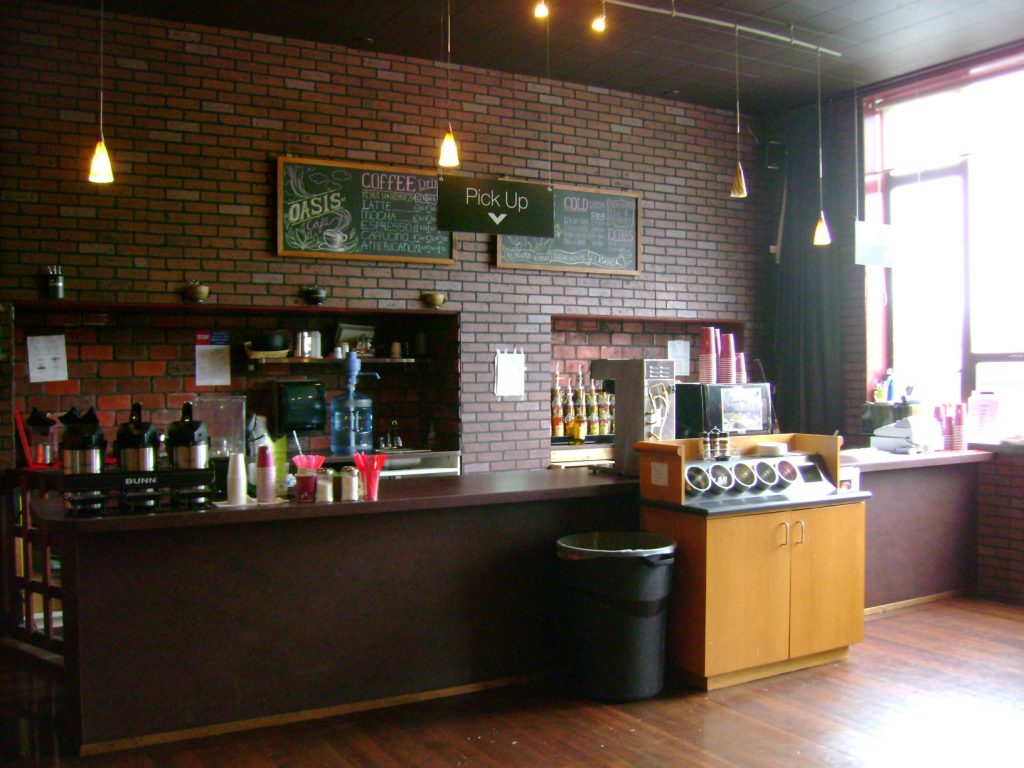
“I thought, wow, this would be a really neat opportunity to partner together — the church and World Relief — and provide some practical training [to refugees].”
Within a year, Holly helped Calvary Chapel South launch a barista training program for newly arrived refugees and immigrants. Since then, Holly has also launched the training program at Brooklake Church in Federal Way, where she now works as the Outreach Director.
Both churches partner with World Relief Western Washington’s Employment Services to identify and refer participants to the programs. So far, the two churches have trained more than 25 refugees.
More Than a Training Program
Much like the Cambodian cafe that first inspired Holly, the barista program in Washington is designed to meet each participant’s individual needs. Focusing on only a few students at a time, training sessions are tailored based on the trainee’s prior work experience and English level.
Participants are enrolled in a 12-week program that takes place every Sunday while church coffee shops are up and running. Each week, participants focus on learning how to run one aspect of the coffee shop, while also practicing their English and customer service skills.
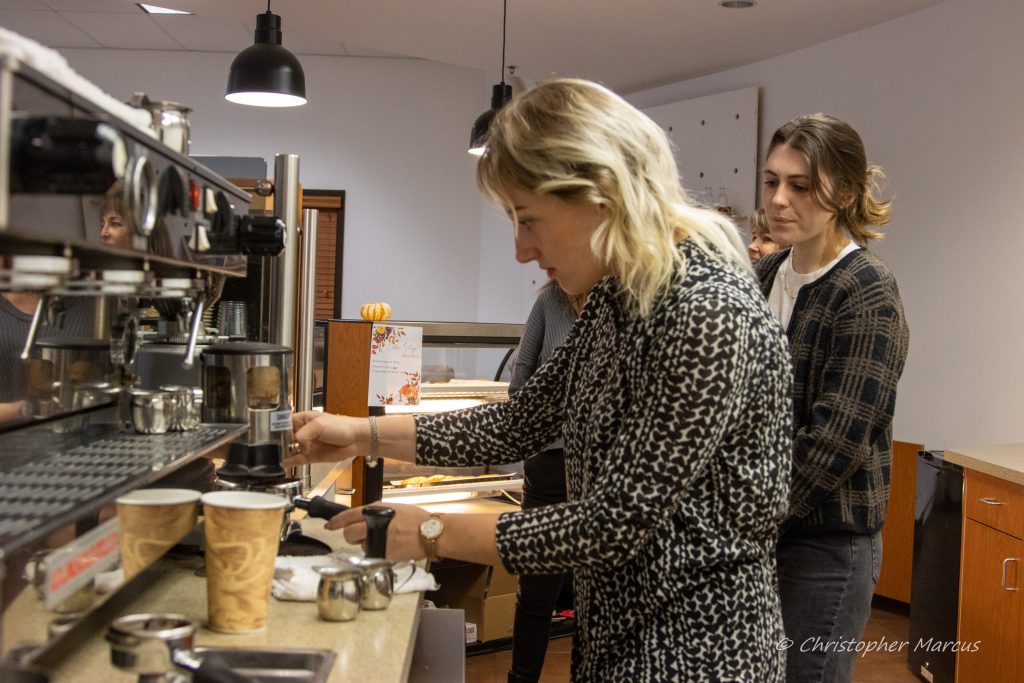
But there’s more to the program than barista skills and English — there’s an opportunity to form friendships. Tutors intentionally leave space for navigating culture and offering encouragement, advice and even prayer when appropriate.
“The churches don’t just help our participants learn new skills,” said Santa Pradhan, Employment Program Manager at World Relief Western Washington. “They also welcome them with open arms and give them a sense of community.”
As tutors help trainees feel like “less of a stranger,” trainees help tutors expand their understanding of refugees and immigrants and clarify misperceptions. “Our participants have been instrumental in helping the church to be better at following God’s call for us to welcome the stranger,” Holly said.
As participants and volunteers become invested in one another’s lives, many form friendships that last long beyond the end of the program.
Careers Beyond Coffee
This was the case for Hawraa. After resettling in the U.S. from Iraq, she joined the barista training program in early 2016. Today, Hawraa remains friends with Holly and the volunteers from Calvary Chapel South’s coffee shop training, and she credits the program with teaching her more than barista skills. She also learned customer service and how to interact with others in a U.S. workplace, lessons that would carry her career beyond the coffee shop.
“[The barista program] was the first thing that I participated in that was close to a job when I first came to the United States. It prepared me for bigger things that I went on to do,” she said.
Hawraa is now working as a case manager with Puget Sound Training Center, helping other refugees, immigrants and under-served populations achieve career success in the U.S.
When asked what advice she would give to U.S. churches hoping to welcome refugees and immigrants, she said, “Please offer them participation in programs and events, help them as much as possible with their English since most are too embarrassed to make mistakes, and just smile! Seeing smiling, welcoming faces was one of the best things when coming to the United States.”
Why the Church?
Like World Relief, Holly believes the church is called to embody the hope of Jesus in the midst of a hurting world. One of the ways churches in the U.S. can do that is by welcoming new immigrants into their communities and seeking to learn from one another.
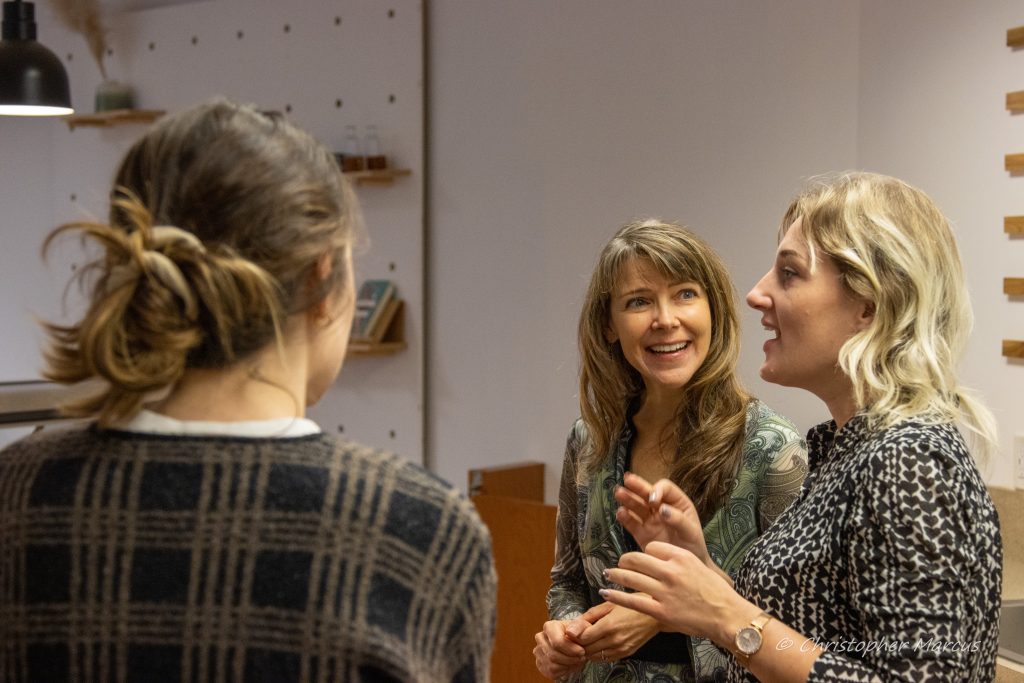
“We see in the establishment of the early church, God’s design… is for people to come together, pour over his Word and to fellowship with one another in a deep and devoted way,” she said. “How amazing when the local church can enfold newcomers into this kind of community.”
For churches not yet connected with refugees and immigrants, Holly suggests first discovering who is already providing services for refugees and immigrants, including established immigrant communities. Work together to determine how best to be a supportive partner in the resettlement process.
She also recommends taking note of what your church already has that might help in welcoming someone who has recently arrived in the U.S.
While not every church has a full coffee shop, others may have shuttles available to provide transportation to local thrift stores or markets, or business owners from local churches might host a small job fair. English tutoring, access to computers, job search assistance and fun after-school activities can also make a big impact.
But most importantly, Holly emphasizes the value of friendship as we seek to create more welcoming communities where everyone can thrive.
“The church can first and foremost be a friend,” she said. “Rest from ‘doing’ and leave room for just being together, sharing life and learning from one another. Be hospitable and accept hospitality. This is a ministry in itself.”
Want to be a part of creating lasting change for refugees, immigrants and people experiencing vulnerability around the world? Learn how we’re moving forward together.
If your church is ready to dive deeper into how best to love and welcome your refugee and immigrant neighbors, check out The Workshop, World Relief’s e-learning platform. Use code CHURCH25 for 25% off through January 31, 2023.

Kelly Hill serves as a Content Writer at World Relief and previously served as Volunteer Services Manager at World Relief Triad in North Carolina. With a background in International and Intercultural Communication, she is passionate about the power of story to connect people of diverse experiences.
Disability-Inclusive Development: How the Church Can Answer the Call
“So also we are many persons. But in Christ we are one body. And each part of the body belongs to all the other parts. We all have gifts. They differ according to the grace God has given to each of us.” — Romans 12:5-6
Saying Yes to Wisdom
When the Kanombo Church of Central Africa Presbyterian in Malawi made a call for volunteer Sunday school teachers, they did not consider Wisdom Shaba as a viable candidate. Wisdom, after all, was blind. Having suffered from a skin disease that affected his eyes, he lost his sight at the age of five.
But God had bigger plans for Wisdom.
His church, which is a member of one of World Relief’s church networks in Northern Malawi, had agreed to participate in a disability inclusion training conducted by World Relief.
Wisdom attended the training along with other members of the congregation, and it was there that he learned of the need for Sunday school teachers and volunteered himself.
“Despite my disability,” Wisdom said, “I always tell people in my community not to ignore me in other things they feel I can get involved in. I went to school. I speak good English. So, why not involve me?”
Made in the Image of God
At World Relief, we believe every person is created in the image of God and has inherent value — including those with disabilities. And yet, in communities across the globe, people like Wisdom are often pushed to the edges of society and face significant barriers to participating in their communities and accessing critical care.
This lack of inclusion can increase their risk of poverty, violence, social and familial stressors, illness and even death. As a result, people with disabilities represent some of the most marginalized, making up 20% of the world’s poorest in developing countries.
While the statistic is staggering, we believe the church has a role to play in closing the gap on disability inclusion. We believe the church is called to be a place where people with disabilities are not only served, but also valued and included in all programmatic and worship activities.
After all, Jesus himself spent much of his time on earth serving and fellowshipping with people with disabilities. He calls his church to do the same.
“When you give a banquet,” Jesus said in Luke 14, “ invite the crippled, the lame, the blind.”
That’s why, in 2019, World Relief piloted disability-inclusive programming through our Church Empowerment Zone initiative in Malawi.
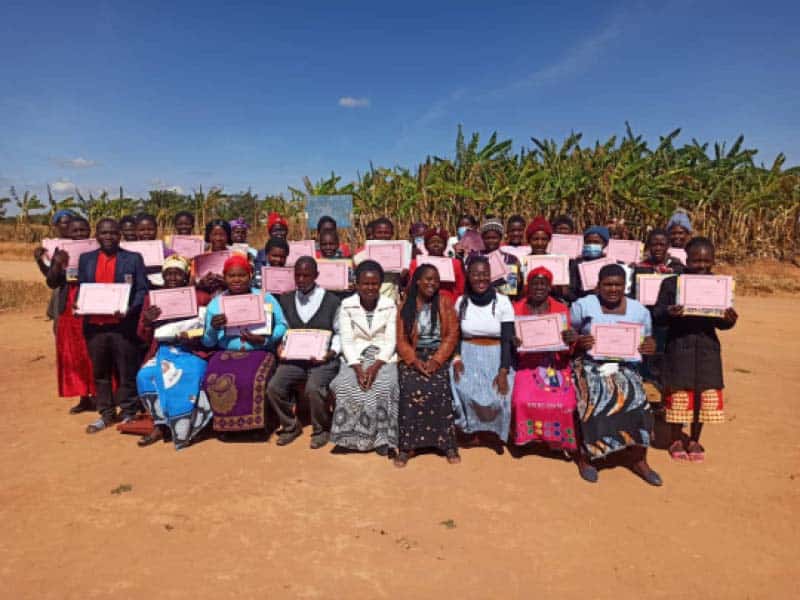
What is Disability-Inclusive Development?
Disability-inclusive development ensures that people with disabilities are able to access and participate in development activities in the same way as persons without disabilities. It is not a separate program, rather World Relief staff, local church leaders and community members receive training that:
- helps church leaders understand the prevalence and impact of disability in their communities
- ensures active involvement of people with disabilities in all phases of a project
- assists church and community leaders in identifying and removing physical, communication, policy and attitudinal barriers to participation in program activities
The fruit of this work has not only brought dignity and restoration to people with disabilities but has also empowered members of the body of Christ to better serve people with disabilities. Through the pilot program alone, more than 400 people with disabilities were reached by the church network.
“World Relief came and opened our eyes to see the most vulnerable among us — people with disabilities…” said one church leader. “We have whole-heartedly embraced [Jesus’] call to care for people with disabilities in our communities.”
An Inclusive World
After Wisdom volunteered to teach Sunday school, the leaders of his church organized a practice session where Wisdom taught a lesson to two children. He used a small book to teach on the topic “guiding children to the Savior.”
Everyone was amazed at the skill with which he explained spiritual truths to the children.
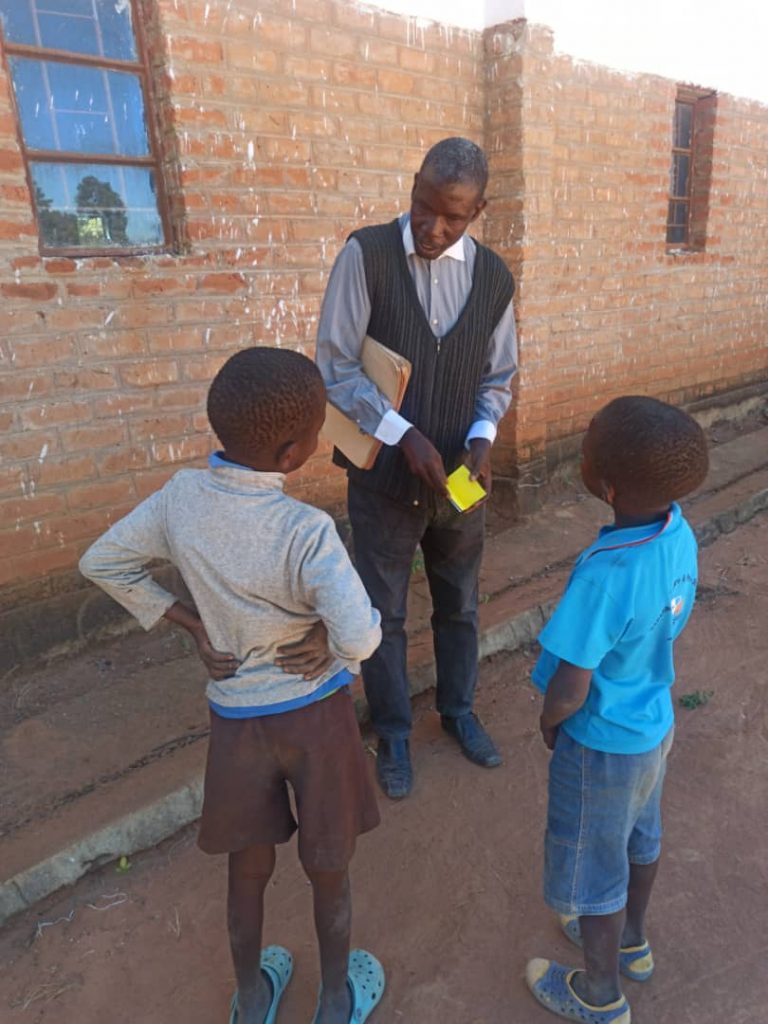
“God creates ways for me to do things that people don’t expect me to do because I am blind.” Wisdom said. “People don’t involve me in community gatherings because they always judge that I cannot do so. But I thank God because He blessed me with this disability I have. I strongly believe that this disability is not a curse.”
Reverend Mphatso Chidothe, who helped facilitate the disability inclusion training at Wisdom’s church shared that he has “realized that disability is not inability.”
“I am pleased with Wisdom for his time management, active participation and his performance throughout the training. I look forward to visiting him at his church one day,” Reverend Chidothe said.
By working through the local church, we are creating communities where people with disabilities are included as active and valuable participants in their communities. Church members come to learn that people with disabilities are not just there to be served, but also have God-given gifts and abilities that they can bring to serving others as well.
Since the programming was piloted in Malawi, World Relief has expanded disability-inclusive programming to church networks in Burundi and Rwanda, and now plans to train churches in six more countries where World Relief works as funds become available.
By removing barriers to participation, we are making way for entire communities to be transformed as the gifts of each and every person are recognized and given space to shine for the glory of God.
Together, we are going further to reach more people through more churches than ever before. Will you join us?
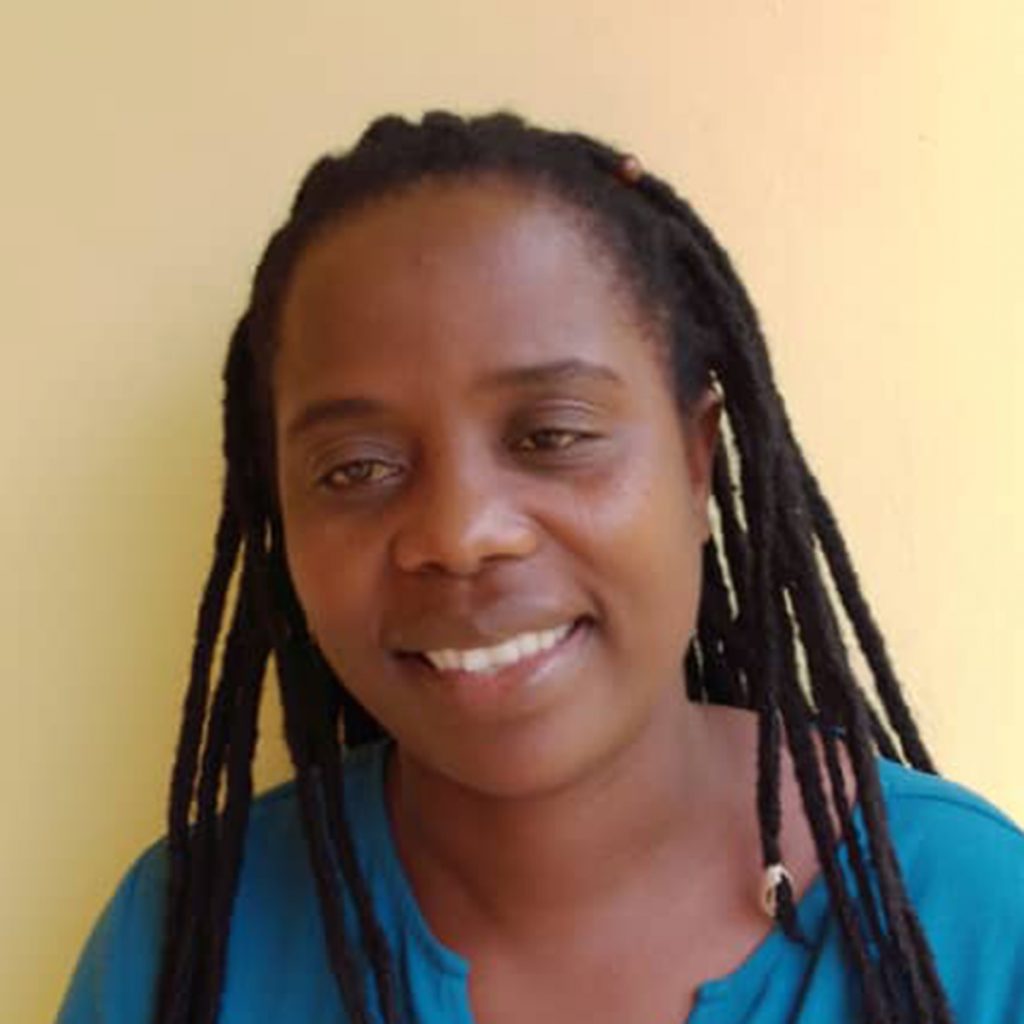
Muhlabase Ziba joined World Relief in August 2019. She works as the Families for Life and Child Development Field Coordinator in Malawi’s Mzimba District where she develops programs, coordinates with stakeholders, conducts trainings and collects stories of impact. She is passionate about helping children build self esteem, strengthening couple relationships and providing neglected children with the psychosocial support they need. In her spare time she enjoys spending time with the children in her own life and watching the Wildlife National Geographic channel.

Rachel Clair is a Content Manager at World Relief. Alongside an amazing team of marketing colleagues, she manages the curation and creation of written and multi-media content for World Relief’s global platforms. With more than 10 years of experience creating content for churches and non-profits, she is passionate about developing content that challenges both individuals and communities to lean into all of whom God created them to be. She holds a BFA from Stephens College and is currently participating in a spiritual formation cohort through the Transforming Center in Wheaton, IL.
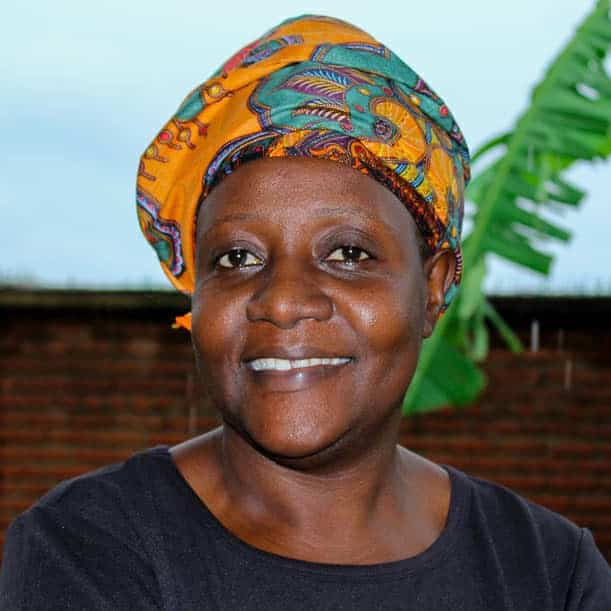
Veronica Kaitano serves as the Gender Equality Social Inclusion Technical Advisor with the World Relief’s Programs Resources Team. Through her work, Veronica supports World Relief’s country offices in ensuring the integration of a gender and social inclusion approach within programming and acts as the global technical lead for supporting implementation and continued growth of World Relief’s couple strengthening model Families for Life, with a specific emphasis on disability inclusion.
Worth the Wait: A Story of Faith, Perseverance and Love, Despite the Odds
For seven years, Congolese refugees (and newlyweds!), Mbimbi and Goreth, didn’t know if they would ever see each other again. Separated by continents, Mbimbi was stuck in Burundi while Goreth resettled and began her new life in America. In spite of the long wait, the two of them never lost hope, their love growing by the day.
“No one can do what Goreth did,” Mbimbi said about his wife’s commitment not to remarry. Instead, Goreth chose to hold onto hope, believing God was faithful and would bring Mbimbi back to her in America.
Where It All Began
In 2008, Goreth was a wife and mother living in Goma, a city in Democratic Republic of Congo (DRC). Her day began like any other day – she woke up, brushed her teeth, made some tea and headed to the market to sell clothes at her stand. It became a day she would never forget when “the fighting broke out.” She recalls, “My daughters, [Christine and Valentine], and I started running, and we found a way to get past Goma to Burundi. That’s when I started my life as a refugee. My [first] husband died in the fights.”
Goreth and her daughters ended up in a Burundian town filled with other refugees. Upon arrival she shares, “I felt relief because of sleeping in a house and churches help us and Christians help us.”
While Goreth and her daughters were refugees in Burundi, Mbimbi was working as an auto mechanic in Baraka, a city south of Goma in DRC.
In 2014, an armed civilian group put pressure on him to “join them for the fight and to be a soldier.” These groups were once formed to defend the Congolese against rebel armies. But tragically, they have created more chaos and violence than protection for the Congolese peoples.
So, when Mbimbi refused, they threatened him. With a target on his back, he reflects, “That was the night my uncle called me and said, ‘They are looking for you.’” That same day, “I told fishermen what happened and ask if they can help me to another place. They hide me in the boat and carry me down river.”
From there, Mbimbi went to Boku, where “they [gave him a] motorcycle to go to Boda.” From Boda, he traveled to Burundi where he ended up in the same town as Goreth.
Having arrived in the same town six years apart, Goreth and Mbimbi met, by chance, while filling out paperwork to earn refugee status. Goreth was farther along in the process while Mbimbi was just beginning his paperwork. Despite crossing paths at different stages in their journey to flee DR Congo, they formed a connection “and began a relationship.” Within a year, they were married.
Oceans Apart
Even though they were living in a safer town than the cities they had fled, Goreth and Mbimbi couldn’t escape the violence. In 2015, their Burundian town experienced fighting; so, when Goreth was given the opportunity to go to America, she agreed. The catch? Mbimbi wouldn’t be able to join her and her daughters. It was a bag of mixed feelings for Goreth.
“To be a refugee is not an easy thing,” she says. “It’s just a thing you have to do to pray to God. God helped me because I became strong and fight for the kids to grow up…in a safer place.”
Leaving behind her new husband, Goreth and her daughters traveled to America not knowing when and if they would ever be reunited with Mbimbi. When they arrived in the U.S., their new lives began right away.
Goreth remembers they were greeted by World Relief staff and volunteers. “[They] had already found an apartment for us,” she recalls.
Staff and volunteers came alongside Goreth and her kids, taking them to doctors appointments and helping Goreth find a job in manufacturing, packing hospital-grade linens. Goreth expresses sincere gratitude for all of World Relief’s help, especially in “the first three to six months.”
Even though Goreth felt “sad sometimes” she shared with deep conviction that she “still waited and prayed to God” for Mbimbi.
At Last, Together Again
Both her and Mbimbi’s prayers were answered when he was resettled to America in July 2022. Finally reunited with his wife, Mbimbi is taking a World Relief “Zoom job class and language class.”
He takes comfort in knowing that once his job and language classes are complete, he can still count on World Relief.
“It’s not like they abandon you,” he said. “If you still need something, they are there to help.”
Mbimbi and Goreth are currently renting a one-bedroom apartment. Now able to dream together, the couple says, “for the future, we are praying to God that we can get our own house.”
Knowing that God has provided for them before, they are trusting, through prayer and perseverance, that anything is possible!
As crises converge, and global conflict forces more people to flee their homes, it takes all of us, to move forward together, to build peace and lasting change. When you give today, you help us build peace in places like DR Congo while also welcoming those like Goreth and Mbimbi who have been forced to flee to the United States.
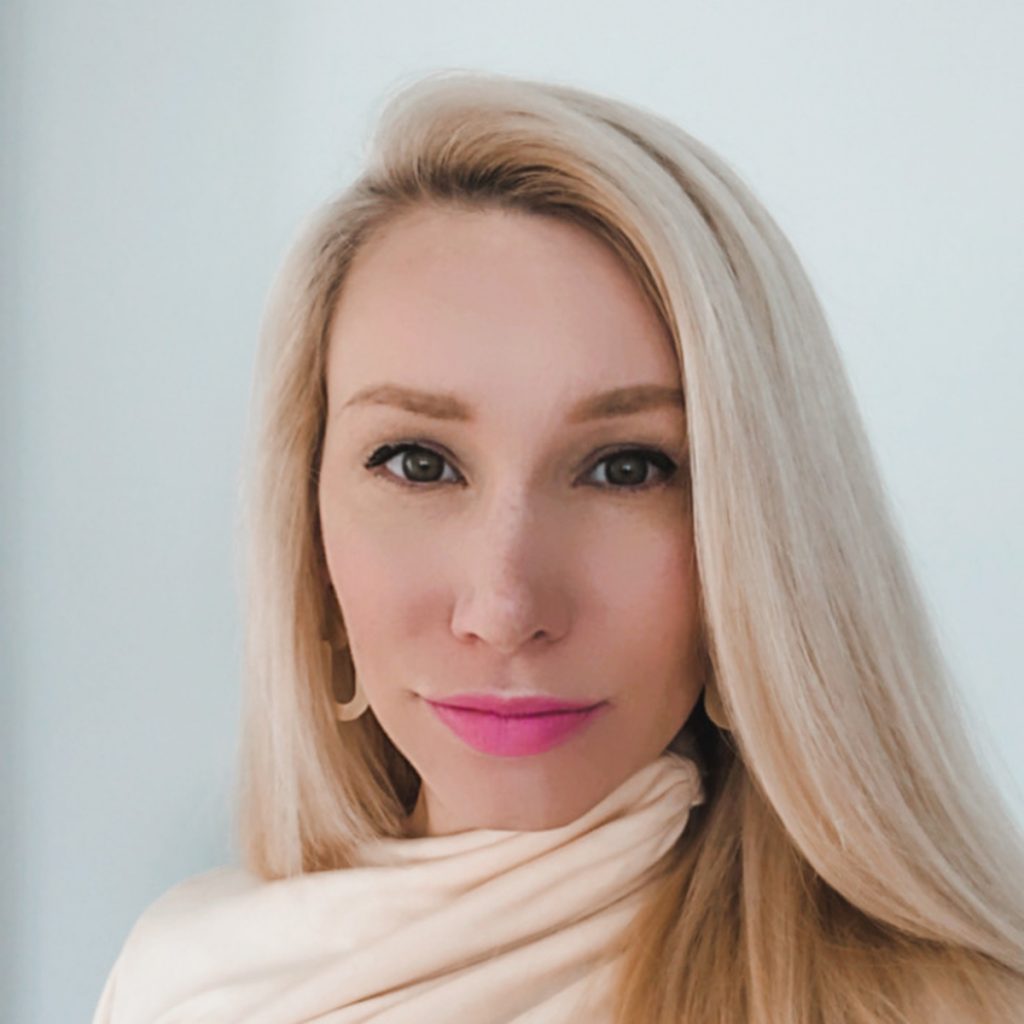
Michelle Visk is a freelance writer passionate about sharing compelling stories of individuals impacted by nonprofits throughout the world. In addition to writing for nonprofits, she recently launched her own interior design e-consulting business, geared at making interior design more accessible to the middle class so everyone can create a home they love. When she’s not writing or doing e-consults, she enjoys spending the majority of her time with her husband and pouring into her two feisty little girls (ages 3.5 and 5) as a stay-at-home-mom. Before becoming a stay-at-home mom, Michelle worked in ministry for 10 years, serving as a Communications Director for a multi-site church. She holds a BS from Butler University.
Through the Flood: How Conflict and Climate Change are Converging in South Sudan
Serving the most vulnerable often means accessing the furthest, hardest-to-reach places in order to meet those in greatest need. For Daniel Erwaga, it meant riding through waist-deep flood waters on a 4×4 all terrain vehicle to assist farmers whose fields had been flooded in South Sudan.
Over the last three years, record amounts of rainfall have led to increased flooding in South Sudan, affecting more than 835,000 people.
According to the United Nations High Commission for Refugees:
Climate change is driving more frequent and intense weather and climate extremes such as cyclones, floods and droughts, negatively impacting agricultural production, food and water resources, and people’s livelihoods. These effects can lead to conflict and humanitarian disasters and are increasingly contributing to displacement in different regions of the world.
Since gaining independence in 2011, South Sudan has struggled with ongoing civil conflict. This political instability has contributed to a food security crisis that today, is being aggravated all the more by climate instability.
Today, former World Relief staff, Daniel Erwaga, joins us from Juba to talk about how conflict and climate change are converging in South Sudan to increase the vulnerability of those already struggling with food insecurity.
Daniel shares his experience as a professional agriculturalist and South Sudanese citizen. Though the events discussed are occurring in South Sudan, we all have a role to play — as crises converge, the only way to move forward is together.
Read on to learn more and join us.
WR: Hi Daniel. Thanks for being with us today.
Daniel: Thank you. I’m so much pleased to have this interview.
WR: Could you start by telling us about the type of work you did for World Relief South Sudan?
Daniel: I started working with World Relief in 2017 until 2022 in March when my contract ended. I worked on emergency projects in partnership with OFDA and FAO. My role as an agriculturalist was to help people in Fangak and Koch communities understand the value of farming as a vocation. People here are pastoralists. They don’t know much about farming. I teach them everything from how to successfully grow crops all the way to running a business and selling their crops in the market.
WR: What prompted you to pursue a career as an agriculturalist?
Daniel: Of course. I’ve chosen this career based on my mentor – my father. He was also an agriculturalist. Back home, he had a kitchen garden and that kitchen garden impressed me. I told him I wanted to become an agriculturalist the same as him and he said, “No problem. You can do that.”
It is both love and a desire to have knowledge that pushed me to go into agriculture. When I was young, I thought to myself, “Of course, food is being produced by an agriculturalist. Why don’t you go and become a professional farmer because day and night, people are eating?” If I can go into agriculture, I can have a broader understanding of farming to help secure the nation, which is struggling with food insecurity.
WR: Can you share more about why this work is so important for communities in South Sudan?
Daniel: Yes. Currently, more than 8 million people are experiencing hunger in South Sudan. My philosophy is that I am helping them help themselves. Through our efforts, farmers are able to do for themselves because of the training and agronomic practices they learn. Of course, when there is conflict, people can’t cultivate the land, and often they move to another location. This mass migration into other territories can lead to more conflict and food shortages. And then there is the flood issue.
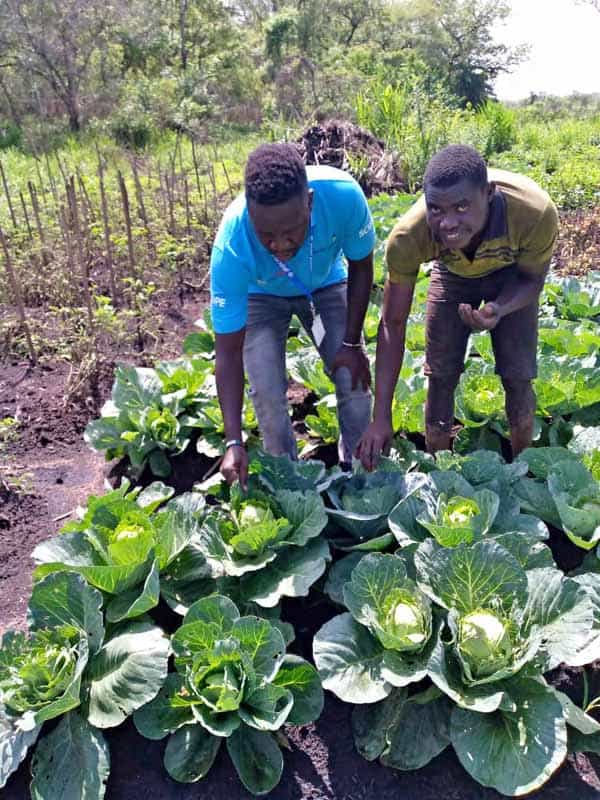
WR: How are you seeing the effects of climate change in the communities where you have worked?
Daniel: Climate change isn’t just in South Sudan, it’s everywhere. When there’s too much rain, it destroys crops from the gardens. I know you guys may not see it in the U.S., but here, we can also see the impact of climate change where animals die day and night because they don’t have anywhere to graze and they don’t have anywhere to stand. That’s part of it, but it also affects crops. You cannot harvest, of course, when your garden is flooded with water.
WR: In your experience, how have you seen conflict and climate change as being connected?
Daniel: Yes. In my own experience, climate change has nothing to do with conflict, but it also has something to do with conflict. Most of the conflict that happens in South Sudan is because of the power struggle. But on the other hand, climate change has contributed to the effects of the conflict.
Let’s take an example like Jonglei State. They’re pastoralists. When the floods came, they moved with their animals to the Equatorial states where the Equatorian people are farmers. When the people from Jonglei come with a large number of herds and cattle, they almost always bring conflict to the new community.
The pastoralists and farmers don’t communicate or collaborate with one another. So, when the pastoralists graze their animal in the farmer’s field, the animal will eat the crops of the farmer, and that’s where the conflict will come in. The flooding, which is caused as a result of climate change, also contributes to the conflict.
WR: There’s a photo of you that has become very popular at Word Relief. Can you tell us what was going on in that picture?
Daniel: You saw me on the convoy? Yes. It was last year in September. Some farmers had been calling me to go and check their gardens [which had been flooded]. I was riding in a truck, but I got stuck. Moving forward was a bit challenging. The place was flooded, so I could not move. I had to stop and assess how shallow the water was because the flood had covered the road, so there was nothing I could do. I could not go back and then I could not go forward.
That’s why I took the initiative of using the quad bike because the car could not access the road. I wanted to see how the garden had been flooded so I could give a report to see how those communities can be helped.
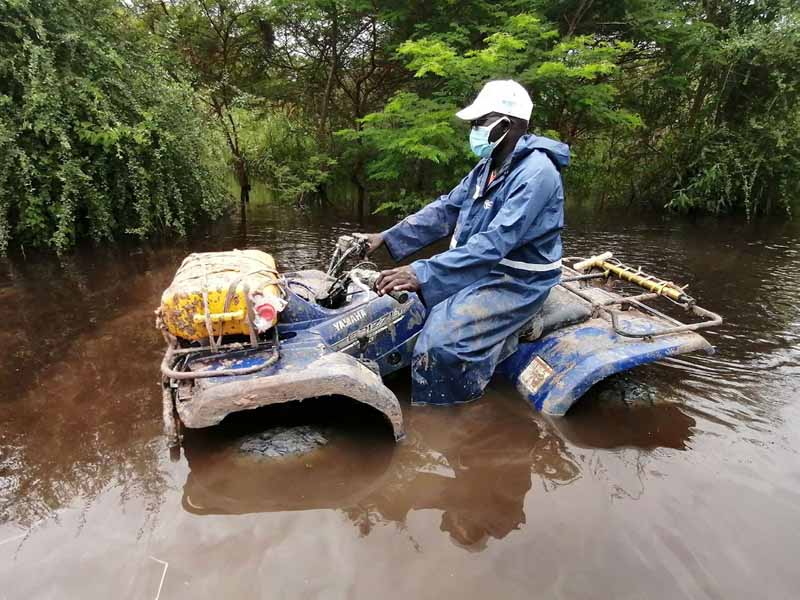
WR: If somebody’s garden is flooded, what kind of help is available to them through World Relief?
Daniel: First, you want to provide basic necessities like offering food because if the garden has been flooded, the person doesn’t expect to yield out of [a flooded garden]. You need to offer help. Then, if the flooding is not so much, you can dig a dyke, which can control the flood from entering into the garden. Those are the things I’ve been helping the farmers to do.
WR: Does South Sudan usually have a rainy season and a dry season, and has that changed?
Daniel: Yes. We have two seasons here, rain season and then dry season. As I’m speaking now, people are complaining because people are sleeping over the water. As a result, there is mass migration. People are moving out to higher elevated ground because of the flood.* Currently, we are now in the rainy season.
WR: What challenges does it create when so many people have to move to a new place because of flooding?
Daniel: There are a lot of challenges, one of which is shelter because when you migrate to a new location, you may find it hard for you to find shelter. Finding a place to sleep is a problem. Also toilets. A lot of disease can come when people don’t have a place to use the toilet. Also, as I said, there is even community conflict as a result of climate change and migration. People from Jonglei State are also migrating to Equatorian states where the flooding is less. They’re coming with their animals, and then the animals are eating another farmer’s crops, so there is conflict when this happens.
WR: At World Relief, we’ve been talking a lot about COVID, conflict and climate change. What do you think the Christian community can do to help with these crises?
Daniel: Christian community can play a big role in addressing crises like COVID-19. First, they can establish psychosocial support structures in the community to help people who are traumatized, who are affected with COVID-19. We can also build on that by procuring face masks and creating awareness.
Now, when it comes to conflict, the Christian community can promote peace and reconciliation and dialogue forums to address the issue of conflict. Christian community can also provide training in peace-making methodology to address the issue of conflict. These are things World Relief does well in engaging church leaders in the process.
The Christian community can respond differently than other individuals or governing bodies because the church leader is listened to and is trusted by members of the community.
WR: What do you want the global community to know about South Sudan?
Daniel: Of course, most of the global community doesn’t know about South Sudan. South Sudan is the world’s newest nation, gaining independence on July 9th of 2011.
Since gaining independence, conflict has renewed in both 2013 and 2016, and the country has suffered severe flooding and drought. Most of the communities are suffering. As I’m speaking, they need much support to build their livelihood and then to recover from the shock of what they’re going through. You can convey our message to the global community so that they know there’s a country, which is so new and these people are suffering. They’re more vulnerable because communities are highly prone to climate-related impacts and a loss of livelihood because of the flooding.
WR: What would you say is your biggest prayer right now for South Sudan?
Daniel: My biggest prayer for South Sudan is for our country’s leadership so that whatever they’re doing, they are first thinking of the people who are suffering. My biggest prayer for the leaders is that they have a heart of forgiving one another because without peace, we cannot do anything. I do pray for that day and night.
WR: Absolutely. We’ll be praying for that too. Similarly, what do you hope for South Sudan?
Daniel: Personally, I hope for the best, a brighter future for South Sudan. In the future, our country is going to be more stabilized and is going to be a peaceful country. Of course, with support from the global community, I know things will improve well. I have hope for a better future for South Sudanese.
In the face of unprecedented challenges, the only way forward is together. Give today and help us reach more people, in more communities, with more resources than we ever dreamed possible.
*South Sudan is home to the Sudd, the world’s largest wetland covering more than 35,000 square miles. While the Sudd is prone to annual flooding, increased rains have affected the length and intensity of the floods. What’s more, the Nile river feeds into the Sudd from Uganda. A prolonged rainy season in Uganda increases the water levels of the Nile, which can lead to more flooding in South Sudan.

Rachel Clair is a Content Manager at World Relief. Alongside an amazing team of marketing colleagues, she manages the curation and creation of written and multi-media content for World Relief’s global platforms. With more than 10 years of experience creating content for churches and non-profits, she is passionate about developing content that challenges both individuals and communities to lean into all of whom God created them to be. She holds a BFA from Stephens College and is currently participating in a spiritual formation cohort through the Transforming Center in Wheaton, IL.
Peace like Breath
These days, peace feels hard to find. International conflicts, ongoing fall-out from COVID-19 and climate disasters can all disrupt our peace and well-being. Yet, at World Relief, we have the privilege of working alongside people who have overcome some of life’s great challenges, finding personal peace even in the midst of difficult circumstances.
That’s why, as a part of our inaugural World Relief Youth Writing Contest, we asked participants in World Relief Durham’s Mentorship Program to reflect on how each of us can be peacebuilders in our own lives and in the lives of those around us.
We are proud to announce Muhammad Hasham Ahmad as our 2022 contest winner! As the leaders of tomorrow, we believe refugee and immigrant youth have important things to say today — things we can all learn and grow from, no matter our age or where we’ve come from.
In his essay below, Muhammad shares how he believes we can all find peace, even in the midst of life’s challenges.
Peace has become a fancy word nowadays. Everyone likes peace but not everyone has it!
For me, peace means to be satisfied — to have a quiet and calm state of mind or simply to be in a situation where you are not worried about anything. From this definition, we can assume not everyone has peace.
Every year, there are millions of people who migrate because of problems they face that make them lose their peace. People leave their home country, some leaving their family and friends, to go to a new country in the hopes of finding peace.
Do you think they find their peace as soon as they land in a new country? No! They still have to face many problems in those new countries too — like my mom did.
She came to the U.S. without knowing any English. At first, she wasn’t able to communicate, but as time passed, she learned English well enough to be understood.
But still my mom worries as millions of thoughts cross her mind every day. Thoughts like: how am I going to provide for my children, myself, housing, insurance, finding work? How are my family back home doing? And many more worries…
Now, let’s talk about how children can lose their peace. Some come to the U.S. with little to no ability to write or speak English because they didn’t have the opportunity to go to school — like I didn’t.
Nowadays, all kinds of people lose peace in childhood because they are worried about living up to society’s standards. Standards like having good grades — fun fact: in an Asian household like mine, you better bring a report card home with all A’s! — a successful future, handling bullies at school, stress from moving, leaving old friends, getting along with new people and much more.
It is natural to lose peace while going through all of this. Everyone wants peace in their life, but not everyone knows how they can find it.
Peace may not be easy to find, but I remember something my teacher once said: “It is human nature to never be satisfied with what we have, so we worry about what we don’t have. If you keep worrying about something you can’t control, you will lose what you can control. So focus on your present rather than the future.”
This helps me find my peace.
We all should work on ourselves to become better, more peaceful people. Focus less on the expectations of others and worries about the future, and you will most likely find peace.
Lastly, I think peace should be as important as breathing. What happens if we don’t breathe? We die! In the same way, not having peace of mind slowly kills you every day and every moment. We lose our concentration and our ability to act and be in the present moment.
So work with the things you can control to save yourself from dying every day. That’s how we can all live a happy and peaceful life!
Pave the Path to lasting change. For young people like Muhammad, finding peace in a new home takes time. You can help create more opportunities for immigrant and refugee youth to heal, thrive and share their voices by joining our community of committed, monthly donors, The Path.
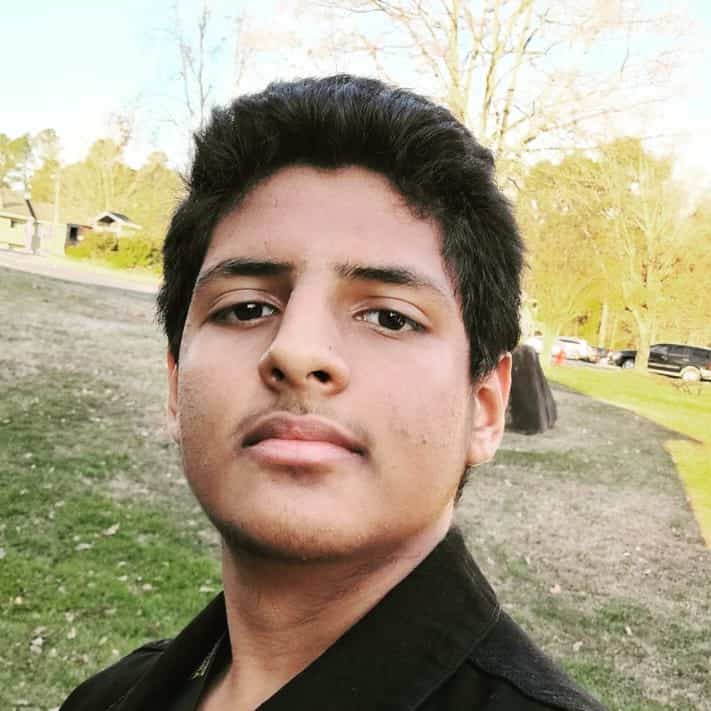
Muhammad Hasham Ahmad is 15 years old and lives in Durham, North Carolina. He came to the U.S. with his family four years ago after leaving his home country of Pakistan. He loves writing and making people laugh with his stories.









